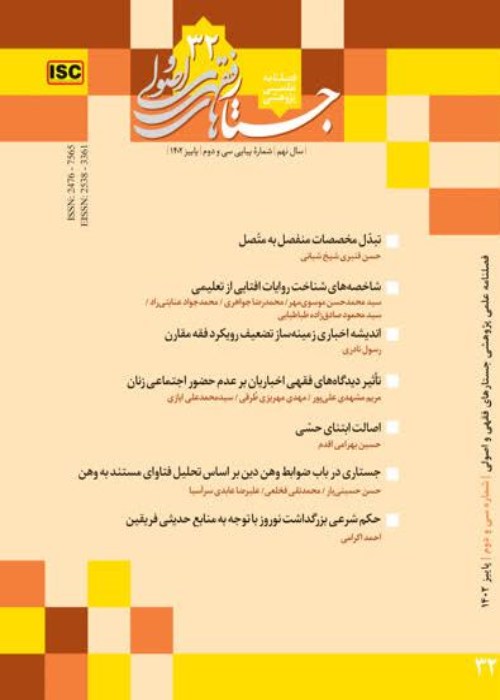Religious Expediency and Coercion and its Effect on Family Prescriptions from Jurist's Perspectives
Author(s):
Abstract:
Expediency and coercion are among old topics in Shariah whose function is realized in jurisprudence. The legislator has been variably considering this fact that a framework should be established in the rulings and prescriptions to make these rules flexible. The legislator asses mukallaf's (the one who is obliged to perform religious duties) conditions and the status in which he is situated to specify the servant's quality of obedience so that he is known obedient in special conditions even if he committed a forbidden, while he would be known guilty and sinful in usual situations if he committed the same crime. Expediency is compatible with human's purpose in this world and the Hereafter which consequently ends in access to profit and prevent from loss whose authority is proven as the intellectual's conduct is proven. Likewise, if the expediency is a bound one, the rule of intellect's rule and canon may obtain its authority. Coercion is an intolerable status which seduces a person and makes him commit sin and abandons dues. The guaranty for the authority of coercion and its consequent rules are indications such as the Quran, traditions and intellect. The researcher has attempted to propose introductory discussions and to provide comparative samples from the issue of expediency and coercion and to compare expediency and coercion so that their distinctions and similarities are identified. This question is also to be answered that how expediency and coercion may contribute to the issue of family and becomes a source for legislating prescriptions by the jurists. By going through samples from the prescriptions of family such as infants, it is concluded that the legislator has falsified the rules pertaining kids and infants based on expediency and envy, so that by deducing the rule pertaining the kids by the jurists, it is concluded that expediency enjoys a high status, hence, observing expediency in the process of law making has extended its influence. Similarly, the existence of coercion and obligation in the pertaining rules of family namely kids and infants could establish secondary status and impose prescriptions on them.
Keywords:
expediency , obligation , coercion , family , infants
Language:
Persian
Published:
The Research Journal Fighi & Usuli Research, Volume:2 Issue: 2, 2016
Pages:
49 to 73
magiran.com/p1676218
دانلود و مطالعه متن این مقاله با یکی از روشهای زیر امکان پذیر است:
اشتراک شخصی
با عضویت و پرداخت آنلاین حق اشتراک یکساله به مبلغ 1,390,000ريال میتوانید 70 عنوان مطلب دانلود کنید!
اشتراک سازمانی
به کتابخانه دانشگاه یا محل کار خود پیشنهاد کنید تا اشتراک سازمانی این پایگاه را برای دسترسی نامحدود همه کاربران به متن مطالب تهیه نمایند!
توجه!
- حق عضویت دریافتی صرف حمایت از نشریات عضو و نگهداری، تکمیل و توسعه مگیران میشود.
- پرداخت حق اشتراک و دانلود مقالات اجازه بازنشر آن در سایر رسانههای چاپی و دیجیتال را به کاربر نمیدهد.
In order to view content subscription is required
Personal subscription
Subscribe magiran.com for 70 € euros via PayPal and download 70 articles during a year.
Organization subscription
Please contact us to subscribe your university or library for unlimited access!


